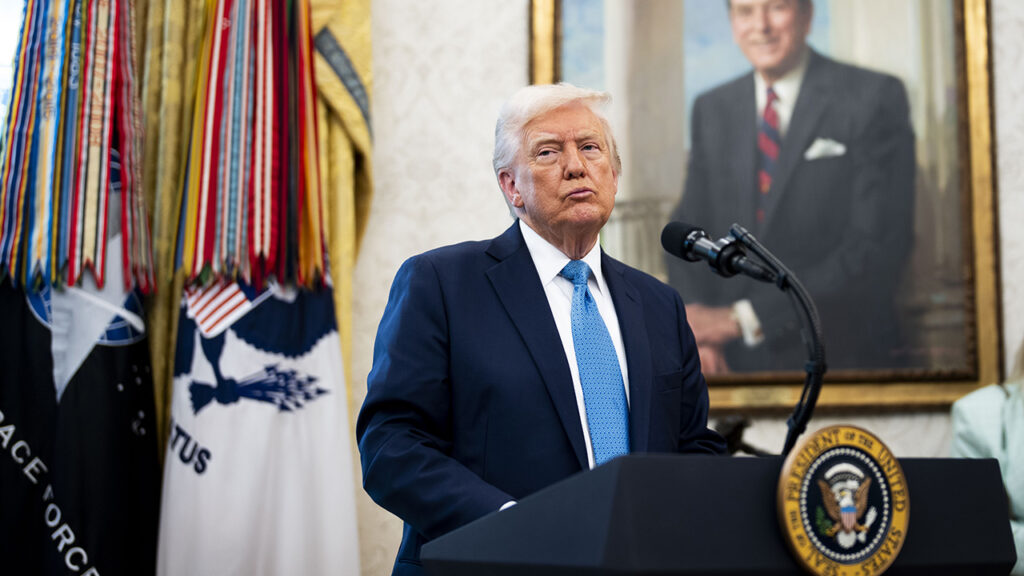Vehicles are passed through final inspection at the end of the assembly line at the General Motors facility in Spring Hill, Tenn., Oct. 7, 2024. Sales of cars picked up recently partly as buyers rushed to lock in deals before President Trump’s 25 percent tariffs on cars and auto parts go into effect. (Brett Carlsen/The New York Times)

- U.S. auto sales surged in March as buyers rushed to purchase vehicles before Trump's 25% tariffs on imported cars take effect Thursday.
- Hyundai saw a 13% sales increase, while Ford’s dealership sales rose 19% and GM reported a 17% quarterly increase.
- Hybrid and electric vehicle sales grew sharply, with GM’s EV sales nearly doubling and Ford’s hybrid sales up 33%.
Share
|
Getting your Trinity Audio player ready...
|
The auto industry witnessed a different kind of March madness last month as buyers flocked to dealerships to lock in deals before President Donald Trump’s auto tariffs lift prices by thousands of dollars, several carmakers said.
“This past weekend was by far the best weekend I’ve seen in a very long time,” Randy Parker, CEP of Hyundai Motor North America, told reporters Tuesday. The company reported a 13% increase in March sales on Monday compared with a year earlier.
Sales Rise for Auto Dealers
Ford Motor said Monday its March sales at dealerships rose 19%. However, Ford’s sales during the overall quarter slipped 1%, to about 500,000 vehicles, because of a decline in sales to fleet customers, the company said.
General Motors did not provide a separate figure for March, but reported that sales in the first quarter rose 17% from a year earlier, to 693,000 vehicles.
Trump said last week that he would impose 25% tariffs on imported vehicles, effective Thursday. The tariffs will be extended to imported auto parts on May 3. Many cars made in U.S. factories contain parts made abroad, frequently exceeding 50% of the vehicle’s value. Analysts estimate that carmakers will have to increase prices of some models by more than $10,000 to compensate for the new levies.
GM, Ford and Hyundai reported increases in sales of electric vehicles and hybrids. GM said its sales of vehicles powered solely by batteries almost doubled, to 32,000 cars, as the electric version of the Equinox sport utility vehicle became widely available. With a starting price of about $35,000, the Equinox is one of the most affordable electric vehicles available in the United States.
Ford Saw Hybrid Sales Rise 33%
Ford said that sales of hybrid vehicles rose 33% and that sales of electric vehicles such as the Mustang Mach-E rose 12%. Sales of cars with internal combustion engines during the quarter fell 5%.
Hyundai said that sales of hybrids soared 68% while sales of pure electric vehicles rose 3%.
Parker said he could not estimate what impact tariffs would have on the company’s prices. Hyundai and its sister company, Kia, have factories in Georgia and Alabama but they import substantial numbers of vehicles from South Korea.
“We haven’t made any firm decisions yet,” Parker said. But he added, “Don’t wait to buy tomorrow what you can buy today.”
—
This article originally appeared in The New York Times.
By Jack Ewing/Brett Carlsen
c. 2025 The New York Times Company
RELATED TOPICS:
Artfully Staged for Takeoff: Fresno Airport Expansion Nears Finish
3 hours ago
Chipotle Tempers Annual Sales Forecast as Dining-out Takes a Hit
3 hours ago
General Motors to Increase Production at Ohio Transmission Facility
3 hours ago
US Justice Department Directs Investigations Over Gender-Affirming Care
3 hours ago
Exclusive: Trump Expected to Sign Order Pushing Training for Skilled Trades
3 hours ago
Kennedy Declares ‘Sugar Is Poison’ While Announcing Ban on Food Dyes
4 hours ago

Five Arrested in Fresno County Robbery Spree. Some Linked to Venezuelan Gang

US Brings First Terrorism Charges Against Alleged Venezuelan Gang Member

Artfully Staged for Takeoff: Fresno Airport Expansion Nears Finish

Chipotle Tempers Annual Sales Forecast as Dining-out Takes a Hit

Wired Wednesday: What’s the Future of Fresno Unified and the Superintendent Position?

Zakaria Draws Parallels Between Trump’s Tariffs, Failed 1930s Economic Policies












